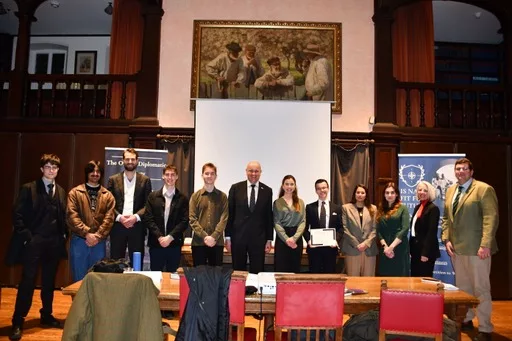Oxford University Diplomatic Society hosted its final NATO-sponsored final competition event of “NATO: Fit for the Future?’ at the end of November in the Town Hall. This competition saw groups consisting of students compete on four topics — space, cybersecurity, NATO partners and climate change — presenting proposals on how NATO should be innovated for the future. The winning team was to be given £500 in an event officiated by four expert judges including Dr Timothy Clack, Joanne Hamer, Myriam Shafique, and Juliana Suess.
The event saw a keynote speech by the Finnish Ambassador to the UK, Jukka Siukosaari, speaking about current geopolitical issues such as Finland’s recent accession to NATO. The Ambassador stated that “not all threats can be defended by a rifle or a tank” and that modern-day threats are increasingly illusive. His Excellency noted that “Ukraine has become the most important and pressing concern of European security” and it was necessary for Türkiye and Hungary to ratify Sweden’s accension. It is “important for NATO to ensure cooperation with other international actors” and “streamline, adapt and coordinate plans”.
The winners talked about future collaboration with eastern partners, a coherent and consistent approach to policy-making, increased institutional capacity for partnerships in key regions, increased development of both the EU’s military capability, and its security policy. The winning team addressed renewing the partnership framework, universalising regional cooperation and the inclusion of key partners.
One of the members of the winning team, first-year student Michał Pietrzak who co-presented on NATO partners and won the competition with another first-year Yassin Hachi, stated he was “interested in NATO and international relations for a while” and that they “both have citizenships in countries within the EU and NATO”. For Pietrzak “talking about NATO is really important” given to the fact that the UK “is a key point within NATO” and “through the club mentorship program we were kind of defining what we were talking about more clearly”.
Teams addressed a whole variety of subtopics within the field including private sector cooperation in regards to cybersecurity, more centralised cyber threat analysis, countering Russian military aggression, Islamist terroism and Chinese expansionism, expanding NATO’s geographical footprint across Africa and the Indo-Pacific. Climate change and space also featured extensively in terms of crisis management, sharing early warning capabilities, standardisation of equipment and increased multinationalism.
A group on climate change saw that NATO’s role in the crisis was to boost a climate aware culture, invest in green technology such as photovoltaics, increase in operational resilience, and modernise international climate architecture.
The outgoing president of the society and project director Rosie Wrigglesworth stated that the competition overall was a “resounding success – it was such a fantastic location and really set the scene for an event of this calibre”. Wrigglesworth went on to state that she was “so grateful to have such distinguished guests including His Excellency the Finnish Ambassador who delivered a thought provoking keynote on Finland’s recent NATO membership”. She commented that “the level of student presentations was very impressive, especially given the short time to prepare”. Rosie stated that “…the committee that we’ve had this term has been amazing … just a fantastic team to work with in making this project come to life.”
Oxford Diplomatic Society is planning to start a Diplomatic Academy next term for aspiring diplomats at the University.



